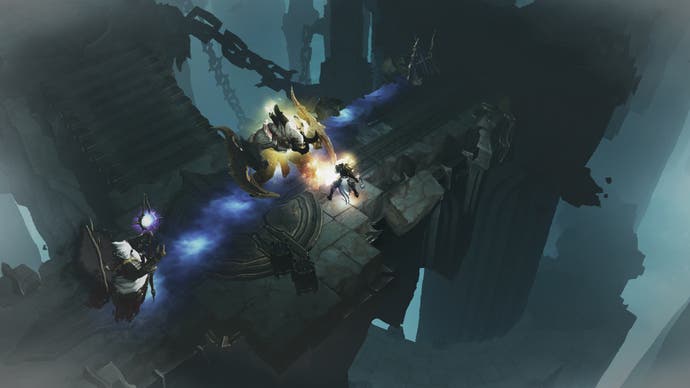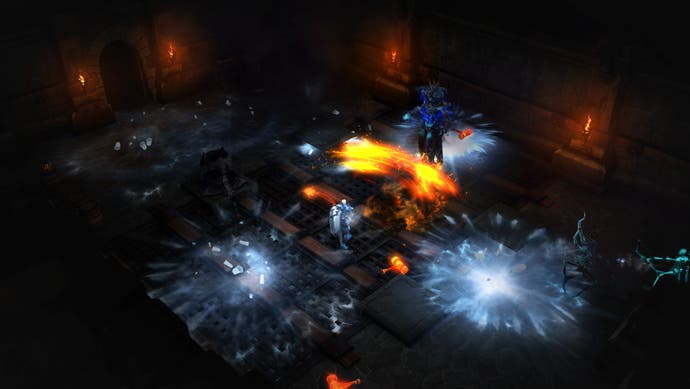The many adventures of Diablo 3: Reaper of Souls
Prepare for a new artisan and a new class - and a new end-game that's too good to leave until the end.
I went to Paris last week to meddle with ultimate evil - or rather, to play Diablo 3: Ultimate Evil Edition. This is the PS4 strain of Blizzard's colourful and divisive action RPG, and it's a game that may actually earn that foolhardy "Ultimate" in its title. It has couch (and online) co-op and all the erupting fireworks you should expect if you've been playing the PS3 or 360 installments - and if you've been playing PS3 version, incidentally, you can look forward to importing your character. Beyond that, the particles seem to be scattered more lavishly, the frame-rate is consistently glorious, and I struggled to see any screen-tearing. Oh yes, and it bundles the forthcoming expansion Reaper of Souls in there too. That really is pretty Ultimate, then - for the time being, at least.
Whether you prefer the console or the PC build is a matter of taste, I suspect. (I'm PC, if only because there's something perversely wonderful about triggering mayhem as elaborate as Rain of Vengeance by pressing 4.) What's interesting is how getting Diablo 3 on consoles in the first place seems to have been an early sign that the flexibility so lacking from the game's original reveal - it will have an Auction House that you will love, and if you want to play it offline, there's always Diablo 2 - was starting to creep back in. Like any decent games company - any games company that makes the sort of things people really care about - Blizzard has a tricky balancing act to perform with each of its projects. It's weighing the hopes of its audience against its own instincts and desires. That's not easy.
Luckily, I think you can see the flexibility that comes from getting that balance more right than wrong at work throughout Reaper itself. It's there in a very small way with the new Mystic artisan, for example. Alongside allowing you to reroll one of the properties of a given item, she's also able to change the appearance of items in general, meaning that you can have the benefits of a certain set of trousers, say, with the form factor of another. Patch 2.0.1 may introduce smart loot, then, but the Mystic introduces flexible loot - and the game should be a lot more accommodating for dapper dungeonistas because of it.

You can also see a bit of that flexibility in the Crusader, too. Reaper's new class is already a favourite in my house - religious zealotry is always fun, of course, but when it's coupled with shield bashes that erupt with that glorious golden light, you're onto something truly special. If you're coming from Diablo 2, the Crusader's sort of an updating of the Paladin class. In the context of Diablo 3, however, it's a punchy kind of compromise, if such a thing is possible - an armoured tank with a mid-range melee option. It's a steel-plated bridge between standard close and ranged attacks, in other words: a new class that offers, yes, flexibility along with a tooth-shattering range of righteous new tricks.
The real flexibility, though, is on display in Adventure mode, and this is where Diablo 3, be it PC and Mac or Ultimate Evil Edition, is really going to live over the next few years. Oli's already offered his take on why Adventure mode's so exciting, but it's worth restating, because this is nothing less than the remixing of the entire game. It's a humpty-dumptyfication of Diablo that shatters the hopes of Blizzard's own storytellers and world builders in favour of giving the power back to the players and letting them construct the action RPG they want. It's magnificent.
Adventure mode lets you spin the Diablo wheel, in essence. You can travel anywhere, through any of the five acts and all of their locations, in search of randomised bounties - little ad-libbed missions that pop up here and there, asking you to defeat a boss, say, or complete an event. Even the lengthiest of bounties will take you no more than ten minutes to complete, and they're so thick with enemies you'll be power-leveling all the way.

Complete enough bounties and you open up a Nephalem Rift. That's where randomisation goes through the roof as you explore procedural environments built of tilesets with weird effects scattered over them. You're smacking around monsters culled from all corners of the campaign until one of the game's bigger bosses is dropped in. There's no story, no lore, no cut-scenes, no entreaties to please defeat X for the love of Y, and yet it's as pure a Diablo experience as you could hope for.
Diablo's always been about killing things, but Reaper of Souls seems to be about killing the series' own sacred cows. Once Adventure mode's out of the box, with its recombinations, its endless ante-upping, its procedural end-game stretching into the horizon, there's no putting it back. It's going to be fascinating - a decade from now most likely - to see how Diablo 4 is shaped by it, given the knowledge of how much fun this much freedom allows for.
And Blizzard clearly knows how much fun it is, which is why, in the current build at least, the design team has placed Adventure mode behind an unlock gate. You'll need to finish Act 5 just once in order to access it. I've played a good chunk of Act 5, and the playing was good - the smart loot drops generously, Westmarch is all chilly cobblestones and gothic finials, and the fireworks erupt everywhere you look. When I spoke to Leonard Boyarsky, Blizzard's senior world designer, he even argued that the standard campaign enriches Adventure mode.
"Players might not realise how much they get from a campaign mode: it's the context," he argues. "When I jump into Zoltun Kulle's dungeons or the Cathedral or the Halls of Agony, or any of the places in Reaper of Souls? The fact that I've played through them, heard the lore, know what the story is? It's kind of like we've set the stage and now you can run around in this world and understand it. I think if we'd sent you to Bastion's Keep, which is a fantastic tileset, and there was just a bunch of demons in there, it would be fun, but without the context of what was going on previously, it just wouldn't have the same resonance. It just sticks in the back of your mind and informs what you're doing without you even realising it. When I get an expansion, the first thing I always want to do is see what's happening with the story. Adventure mode's kind of like my dessert."
That's fine, and it may be true for a lot of players, but once Reaper is unleashed and I've paid my dues to the campaign, I know where you'll find me for the next few years. And I'll probably be pressing 4 as much as possible.
This article was based on a press trip to Paris. Blizzard paid for travel and accommodation.

